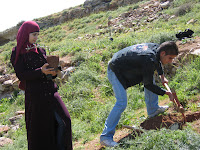
Salam and a group of her friends each grabbed an olive tree sapling, a pick ax, a shovel or some of the other tools to use to plant trees. The teenaged school girls from the Greek Orthodox school in Beit Sahour were part of the 11th grade class trip to celebrate Palestinian Land Day. Organizers had 150 olive trees lined up and ready for the students to put their hands to the tools to establish a new olive grove. Salam and her friends were there to "plant trees for Land day [as we do] every year on this day."
Palestinian Land Day, observed on March 30th and the surrounding days, honors the land, remembers the land lost through the more than 60 year conflict in the region and works in small ways to reclaim some of the land.
Just outside of the town of Beit Sahour (south east from Bethlehem) a municipal park has been built on land that has been tussled over. After 1948, the land was used as a Jordanian military camp. When the Israeli army defeated the Jordanians in 1968, the area reverted to an Israeli military camp that was later abandoned. Various plans have been talked about for the area: Israeli settlers groups are working to establish a new settlement in the area (which they already call Shdema), the villagers in Beit Sahour have built the municipal park and have plans for a children's hospital that they've not been able to begin building. The land is clearly within the West Bank, but because it is officially identified as "Area C" and a "military zone", both Palestinians and Israelis lay claim to the ground.
Women, children and students of Beit Sahour and the surrounding villages were invited by organizers to come on Palestinian Land Day for a social day (for some children -- and their mothers! -- this was the first time they'd been to a playground) and to re-establish an olive grove. As Salam said, "They have taken [the land], and we are planting trees to prove that this is our land."
Salam and her
 classmates were enthusiastic workers, even if they weren't quite sure what to do. Men from the area gave instructions on transplanting the trees (cut away the black plastic bags, dig a hole with the pick-ax and shovel like this, make sure the hole is big enough, drop the tree in -- right side up!, pound the training stick into the dirt as close to the stem as possible, put a plastic sleeve around the tree so the sheep don't eat the tender leaves and repack the dirt around the tree) and then the students went to work.
classmates were enthusiastic workers, even if they weren't quite sure what to do. Men from the area gave instructions on transplanting the trees (cut away the black plastic bags, dig a hole with the pick-ax and shovel like this, make sure the hole is big enough, drop the tree in -- right side up!, pound the training stick into the dirt as close to the stem as possible, put a plastic sleeve around the tree so the sheep don't eat the tender leaves and repack the dirt around the tree) and then the students went to work.






